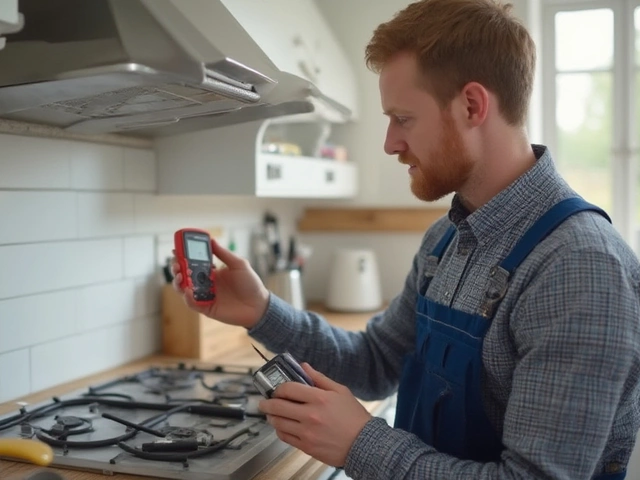Ever found yourself staring at your 7-year-old washing machine, wondering if it's worth the hassle and expense of fixing? You're in good company. Appliances aren't cheap, and with washing machines, things can really get tangled—not just in the laundry sense!
Here's the lowdown: the average lifespan of a washing machine is around 10 to 13 years. But hitting that 7-year mark might mean you're starting to see issues cropping up. Water not draining? That annoying spin cycle catching you at all hours? The real question is, does it make sense to repair these problems now or just start fresh?
Tossing out your machine doesn't always have to be the answer. Often, simple fixes like unclogging a hose or replacing a valve can keep your washer running. But hey, we might need to chat about whether you want to dig into these projects yourself or if it’s a job for the professionals.
Before you go sifting through online sales for a new model, let's take a closer look at what you might actually spend—time, effort, and cash—on these repairs. Consider it like a washing machine check-up for your pocketbook's health too.
- Understanding the Lifespan
- Assessing Repair Costs
- DIY Fixes vs. Professional Help
- When to Consider Replacing
Understanding the Lifespan
Let's talk about how long your faithful washing machine is supposed to last. You might be surprised to know that a typical machine, when properly cared for, can stick around for about 10 to 13 years. But hitting the 7-year mark feels like a crossroads. Should you nurse it through another few years or start fresh with something newer and shinier?
Think of your washing machine's lifespan like candid feedback on those socks it's been laboring to clean. The factors influencing its longevity boil down to the type of washer (front load or top load), how often you use it, and how well you've been maintaining it, like cleaning lint filters regularly. Let’s break it down.
Types of Washers
Front loaders are known for their efficiency and gentle wash cycles, and they can sometimes hold out a bit longer than top loaders. Top loaders, often simpler in design with fewer fancy features, can be built like tanks and last just as long if not longer, depending on the brand and model.
Use and Abuse
If you're running your machine every other day for a family of five, expect more wear and tear than someone who's using theirs once a week. Excessive vibration or noise can be early warning signs of trouble. Sometimes simple adjustments can solve these issues, like ensuring it's level or redistributing an unbalanced load.
| Type of Washer | Average Lifespan |
|---|---|
| Front Loader | 10-12 years |
| Top Loader | 10-13 years |
Preserving Your Appliance
Just like you wouldn't ignore a warning light in your car, you've got to pay attention to your washer's cries for help. Simple maintenance like cleaning out the hoses, not overloading, and using the right detergents makes a world of difference in stretching that lifespan. A little love can add years to its clock.
Understanding your appliance maintenance goes beyond just facing problems. If you're proactive, you might just be able to enjoy another spin out of that trusty machine before it finally gives up the ghost.
Assessing Repair Costs
So, you're sitting there debating whether it's worth pouring more money into an appliance that’s halfway to getting a senior discount. How do you go about weighing the costs and benefits?
Understanding Typical Repair Costs
Most repairs for a washing machine fall within a ballpark range. For common issues, you might see:
- Replacing a malfunctioning water pump: $120–$230
- Fixing a broken lid switch: $85–$160
- Addressing draining problems by clearing a clog: $100–$200
- Solving spinning issues: $150–$300
These are just estimates, and the cost can vary quite a bit based on your location and the specific model of your machine. It's always a good idea to get a few quotes for a fair shake.
The 50% Rule
Ever heard of the 50% rule? It's like flipping a coin but with a bit more logic. If the repair costs more than half the price of a new washing machine, it might be time to consider starting fresh. For example, if you're looking at a $500 fix for a machine that would cost you $900 to replace, it might be smarter to check out those shiny new washers that got remote start and app integration!
DIY vs. Professional Help
Feeling handy? Some repairs can really be DIY if you're up for the challenge. Fixing a clogged hose or swapping out lint filters? Those are doable at home and can save you a chuck of change. Be wary, however, because tinkering with more complex problems might void a warranty or make things worse if you aren't careful.
Value Beyond Money
It's not all about dollars and cents, though. If your washing machine is part of a matching set with your other home appliances, or if it's particularly energy-efficient, spending a little extra to keep it running might still add value to your home and save energy bills in the long run.
| Repair Type | Approximate Cost |
|---|---|
| Water Pump Replacement | $120–$230 |
| Lid Switch Repair | $85–$160 |
| Clog Clearance | $100–$200 |
| Spinning Problem Fix | $150–$300 |
When tackling the decision of whether to repair or replace, these are the key angles to consider. Use these figures and guidelines to help map out your plan. Don't let a little mechanical hiccup spin your day into a bundle of stress!

DIY Fixes vs. Professional Help
Got a knack for tinkering? Fixing a washing machine might just be your next favorite project. With washing machine repair, there are a few things you can handle yourself, given the right tools and know-how. But when should you throw in the towel and call in the pros?
When DIY Saves the Day
Some issues are minor enough to tackle on your own. A blocked filter or a clogged hose can often be treated with basic cleaning supplies and a touch of patience. These fixes don't usually take more than an afternoon.
- Blocked filters: Unplug the machine, locate the filter (usually at the bottom front), unscrew it, and clean any debris.
- Clogged hoses: Detach the hose, clear any blockages, and reattach securely.
Scored a win? Awesome! You’ve just saved yourself some cash and learned a little more about your trusty appliance.
Call in the Cavalry
When it comes to more severe issues—like electrical faults or motor failure—it's safer to bring in professional help. These problems can not only be technically challenging but also potentially dangerous if you’re not trained.
Hiring a professional might cost anywhere between $150 to $300 depending on the service, but it offers peace of mind and a guarantee of quality. Plus, they often spot other issues that you might not have noticed.
| Issue | DIY or Pro? |
|---|---|
| Blocked filter | DIY |
| Broken motor | Professional |
Balancing these choices boils down to your comfort level with tools and understanding of appliances. Always weigh the cost of parts and labor against the price of a new machine. It might shock you how quickly those repair bills add up!
When to Consider Replacing
You're knee-deep in debating whether to stick with repairs or start afresh with a new washing machine. So, when is it smarter to cut ties and opt for replacement instead of dealing with repairs? Let's break it down.
1. Cost of Repairs vs. Replacement
Here's the math: If you're forking out more than half the cost of a new machine on repairs, it might be time to hit the appliance store. Repairs that cost a good chunk of your washer's original price? Not exactly music to anyone’s ears. Plus, newer models are often more energy-efficient, saving you money down the line on utility bills.
2. Frequency of Breakdowns
Has your washing machine been acting up like a fussy toddler every other week? Continuous breakdowns not only eat your time but also rack up expenses. If repairs have become more frequent than your laundry days, consider it a serious sign that it’s time to part ways with your old machine.
3. Availability of Parts
A 7-year-old washing machine isn't ancient but let's face it, depending on the model, parts might start becoming scarce. If your local repair guy has started giving you that ‘I’ll see what I can do’ look, it might be an indication that replacements are the way forward.
4. Efficiency and Features
Newer models come with features to drool over like smart technology, better energy-efficient options, and even larger load capacities. If your current machine is guzzling water and power like there’s no tomorrow or lacking those modern conveniences, upgrading could be a win for your family’s lifestyle and your wallet.
Deciding to trade in your trusty old washer for a shiny new model isn't an easy call, but balancing these considerations should help you make a choice that suits your household’s needs and finances.







